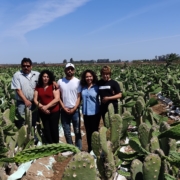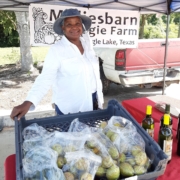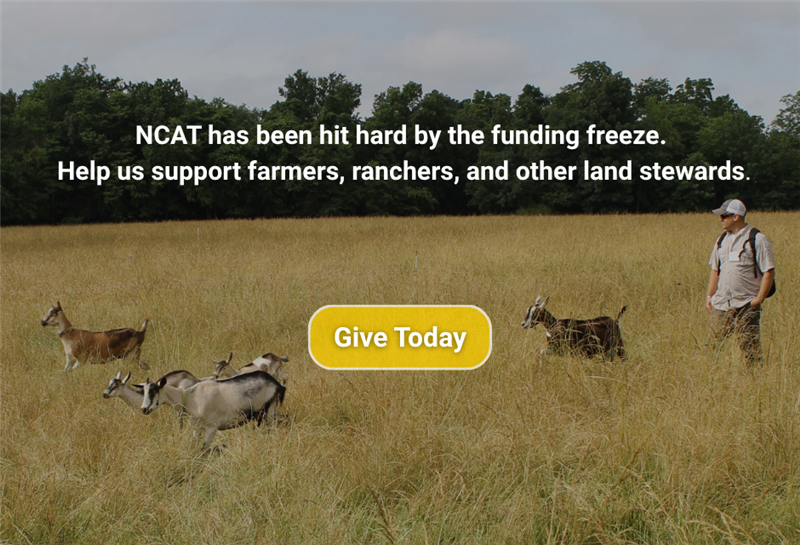Shakera Raygoza
Shakera and Juan Raygoza started Terra Preta Farm in Edinburg, Texas, 14 years ago, and they have accomplished a lot while staying connected to the local community. Their farming journey has not been easy, but they have overcome obstacles through hard work, networking, and constantly adapting to consumer markets and nature.
Terra Preta means dark soil in Portuguese, and often dark soil is a sign of fertility Terra Preta Farm has been organically certified for eight years with a focus on soil fertility. Shakera and Juan began the farm in 2008 to grow fresh organic food for their first daughter. They sold the surplus at local farmer markets. Soon they began to scale and, through the U.S. Department of Agriculture (USDA) EQIP program, got a loan to purchase their current property, equipment, and infrastructure. Currently, they have 20 acres in production and utilize rotation and succession planting. While they initially grew a variety of produce, they soon realized there was a need for organic radishes in Texas, which became their main crop. Their management system developed over time and constantly changed based on climate and pest pressure, focusing on the most efficient way to do things. Their focus on wholesale markets has pushed them to farm more mechanically. For example, because they use a basket weeder, they must plant at the same spacing and distance.
The farm was approved for EQIP funding for high tunnels, but the City did not want to accept the application because their land was zoned residential, and the high tunnels were considered commercial structures. The Raygozas had to apply for a variance to request permission to place them and pay $400 to be heard for an exemption. Shakera and Juan reached out to their friends, neighbors, and people in their networks for support. During the meeting, people showed up and spoke to the council members about the importance of high tunnels for farming, as well as the importance of having local, fresh produce. Unfortunately, the council members denied the variance request because they were not familiar with the tunnels and went with the City’s recommendations. The community was shocked after the big turnout of people advocating for them, so they began calling the City and asking the reasoning behind the denial. The local news station interviewed Shakera and Juan to share their story. A city council member decided to visit the farm to see firsthand what they were doing. As a result of the visit, Shakera and Juan spoke to the mayor, and the other council members went back to the zoning board, requesting that they reconsider. Shakera and Juan were granted a second variance meeting in which the zoning board was more understanding and ultimately granted a permit to install the tunnels. It was not only a huge victory for Terra Preta but also for advocating for local food and educating city staff on the importance of supporting local farmers.
A changing climate and lack of labor have also been a challenge. In past years, the Rio Grande Valley region has experienced freezes, floods, hurricanes, and drought, in addition to constant pest pressure from a subtropical climate. Additionally, finding workers is difficult because other sectors can offer more competitive wages. These challenges have not stopped Shakera and Juan from continuing their business. Currently, they are working to increase the local demand for fresh produce, so they don’t have to ship it to bigger cities, which adds costs that big wholesale buyers do not agree to pay.
Shakera mentioned they learned by trial and error about what works specifically for their region. She highlights that keeping organized records is very important, not only for planning but also because production records are required when applying for loans. They have been successful at growing their business and could make a living from their farm’s revenue. In the future, she would love to see more local participation and would like to have all the produce presold before growing it.
Through their local networks of farmers, they have learned about the local conditions and how to manage pests. They have also relied on books and print resources provided by the National Center for Appropriate Technology (NCAT) and the University of Texas Rio Grande Valley. Additionally, they have taken advantage of USDA financing programs and grants, such as the Texas Young Farmers Grant. They attend conferences when possible and always take the opportunity to gain experience with new tools and with becoming more efficient while still nurturing the environment.
There are many barriers to successful farming, such as harsh climate, lack of local markets, no access to equipment and supplies, and sometimes language and education barriers in applying to grants and loans. While organizations were beneficial, there is always room for improvement in serving BIPOC farmers. Shakera says there could be more research done in the Rio Grande Valley, and more technical assistance to help apply for funding resources such as USDA programs that help small farmers navigate climate catastrophes, marketing, and bookkeeping.









![thumbnail_ed-hunt[1] Ed Hunt](https://attra.ncat.org/wp-content/uploads/2022/08/thumbnail_ed-hunt1-180x180.jpg)


